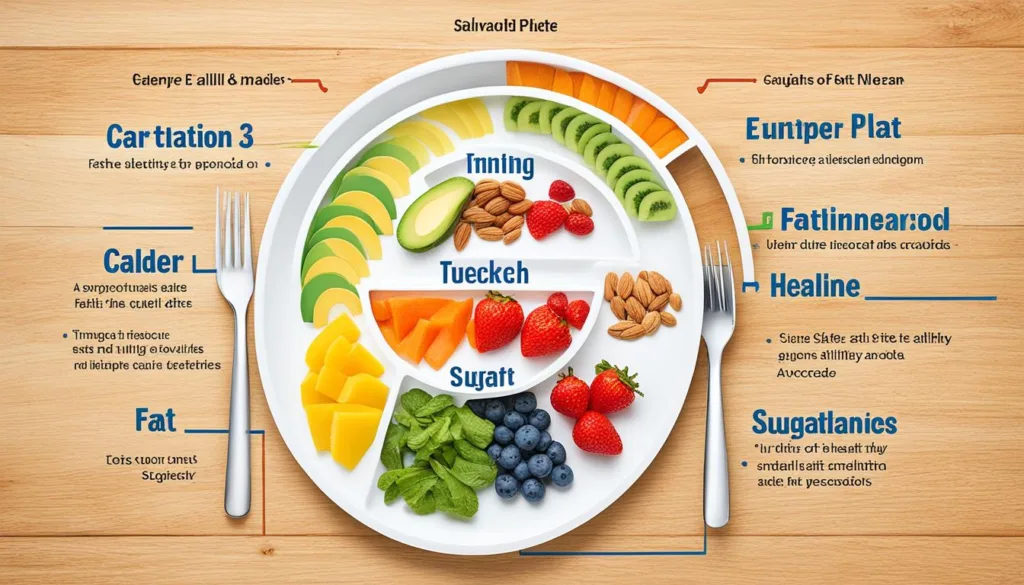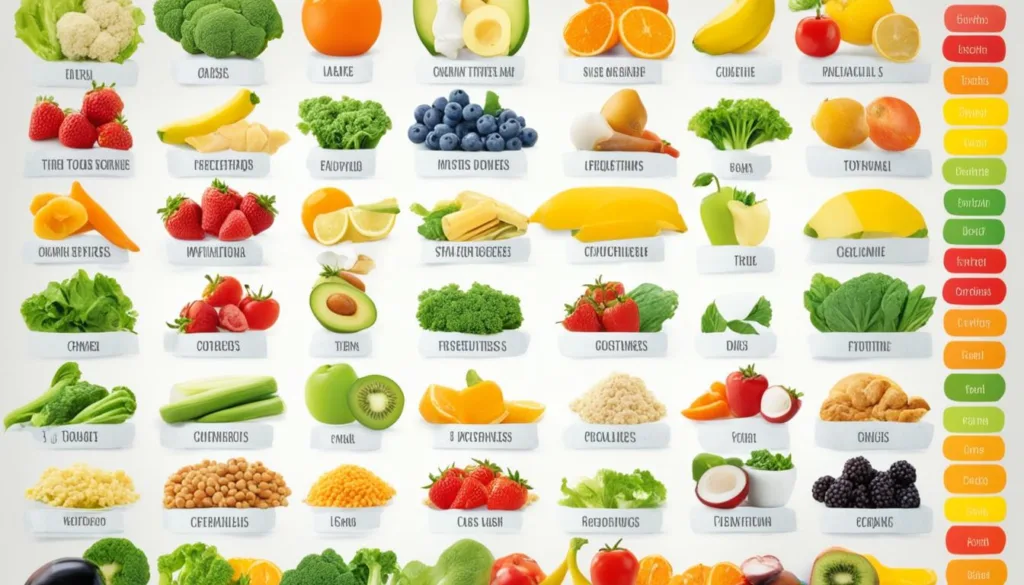Good health and well-being come from eating the right foods. We need certain amounts of vitamins, minerals, proteins, carbohydrates, and fats. These nutrients help our bodies work right. Studies show that eating a variety of foods is key to avoiding chronic diseases, growing well, and staying healthy.
This guide will help you understand your nutritional needs. It will talk about what affects them and how to get the right amounts of nutrients. Knowing what you need helps you make better food choices for your health and happiness.
Key Takeaways
- Nutritional needs refer to the specific amounts of vitamins, minerals, proteins, carbohydrates, and fats required for optimal health.
- A balanced, nutrient-rich diet is essential for reducing the risk of chronic diseases and supporting overall well-being.
- Understanding your unique nutritional needs can help you make informed dietary choices to support your long-term health.
- This guide will explore the importance of nutrition and provide guidance on meeting recommended intakes for various population groups.
- Maintaining a healthy diet and lifestyle is crucial for supporting growth, development, and overall well-being.
Why Nutritional Requirements Matter
Nutrition is key for good health and lowering the chance of chronic diseases. Studies show we need different nutrients like carbs, proteins, fats, vitamins, and minerals in certain amounts. These nutrients help our bodies work right, grow, and develop. Knowing how much we need is important for staying healthy, avoiding nutrient deficiencies, and cutting down on diet-related illnesses.
The Importance of Nutrition for Health
Good nutrition is crucial for our well-being. It helps us get the nutrients we need to:
- Boost our immune system and fight off infections
- Help kids and teens grow and develop healthily
- Keep organs working well and prevent diseases like heart disease, diabetes, and some cancers
- Keep bones strong and lower the risk of osteoporosis
- Improve brain function and mental health
Not getting enough nutrients can cause health problems like anemia, weak immune system, slow growth, and more illnesses. The effects of not eating well can be serious. This shows why it’s important to get the nutrients we need.
| Nutrient | Importance | Deficiency Symptoms |
|---|---|---|
| Iron | Key for making red blood cells and carrying oxygen | Anemia, feeling tired, poor brain function |
| Vitamin A | Important for seeing well, fighting off infections, and healthy skin | Not seeing well at night, dry eyes, getting more infections |
| Calcium | Needed for strong bones and teeth, muscles, and nerves | Osteoporosis, muscle cramps, weird heartbeat |
Knowing the importance of getting the right nutrients helps us make better food choices. This supports our health and well-being.
Factors Affecting Nutritional Needs
Our dietary needs change a lot based on personal factors. Things like age, sex, how active we are, and our health can affect what we need to eat. It’s important to know this to get the right nutrients.
Kids and teens need more energy and nutrients to grow. Older people might need less calories but more of certain vitamins. Athletes need more calories and nutrients to keep going. People with health issues might need different nutrients too.
Accounting for Individual Differences
It’s key to understand these differences to get the right nutrition plan. A one-size-fits-all diet doesn’t work for everyone. By making diets fit each person’s needs, we help them stay healthy and well.
- Age: Growing children, adolescents, and older adults have unique nutritional needs.
- Sex: Men and women often require different amounts of certain nutrients.
- Physical activity level: Active individuals need more calories and macronutrients.
- Health status: Certain medical conditions can impact nutritional requirements.
- Other personal factors: Genetics, metabolism, and lifestyle choices all play a role.
Understanding these factors helps us get the right nutrition for our bodies. By making smart food choices, we can support our health and fit our lifestyles.
“Nutrition is not one-size-fits-all. Optimal health requires a personalized approach that considers the unique needs of each individual.”
Reference Nutrient Intakes (RNIs) and Dietary Reference Values (DRVs)
Reference Nutrient Intakes (RNIs) help people and healthcare workers know how much nutrients they need. In the UK, RNIs set the amounts of proteins, vitamins, and minerals for different groups like kids, adults, and pregnant women. These values are set to cover the needs of most people.
Dietary Reference Values (DRVs) give advice on how much fats, carbohydrates, fiber, and salt we should eat for good health. Together with RNIs, they form a guide to meet our nutritional needs.
The Importance of Nutrient Recommendations
Getting the right nutrient advice is key for staying healthy and avoiding chronic diseases. Knowing about RNIs and DRVs helps people make smart food choices. It also lets healthcare workers give better nutrition advice to their patients.
Whether you’re balancing your diet, managing a health issue, or just wanting to feel better, knowing the latest on nutrients is helpful. It’s a key part of improving your health.
| Nutrient | RNI for Adults | DRV for Adults |
|---|---|---|
| Protein | 45-55 g/day | – |
| Carbohydrates | – | 45-65% of total energy intake |
| Fiber | – | 25-30 g/day |
| Fats | – | 20-35% of total energy intake |
| Sodium | – | Less than 2,300 mg/day |
Understanding RNIs and DRVs helps people make better food choices. It also aids healthcare workers in giving tailored nutrition advice to patients.
Calculating Nutritional Requirements
Finding out what different groups of people need to eat is a big job. In the UK, groups like the Committee on Medical Aspects of Food and Nutrition Policy (COMA) and the Scientific Advisory Committee on Nutrition (SACN) help with this. They look at lots of scientific studies to figure out how much protein, vitamins, and minerals people need. They consider things like age, sex, and life stage.
The way we figure out nutrient requirement calculations is by looking at health, disease, and how nutrients work. This makes sure the advice is based on solid evidence. This careful planning helps make sure people get the nutrients they need to stay healthy.
Nutrient Needs Across Different Groups
What people need from food changes a lot because of things like age, sex, how active they are, and their health. Groups like COMA and SACN work hard to understand these differences. They give tailored recommendations for different groups of people.
- Infants and children need special nutrients for growing and developing.
- Adults need certain nutrients to stay healthy and lower their risk of getting sick.
- Older adults might need different nutrients because of changes that happen as they age.
- People with certain health issues or who are very active might need more or less of some nutrients.
By using scientific evidence, these expert groups make sure the nutrient requirement calculations help people and health workers make good choices about what to eat.
Nutritional Needs Throughout Life
Understanding the nutritional needs at different life stages is key to staying healthy. From childhood to senior years, the amount of nutrients needed changes a lot.
Childhood Nutrition
Kids and teens need lots of energy and nutrients for growth. A balanced diet full of childhood nutrition is vital. Kittens, for example, need a diet with 35-50% protein to grow strong bones.
Adult Nutrition
Adults have different nutrition needs to stay healthy and avoid chronic diseases. About 23% of adults in their middle years need special diets. It’s important they get the right nutrients.
Senior Nutrition
Older people may need different nutrients because of changes in their bodies and health. For example, people over 65 often lack vitamin D, affecting about 40% of them.
It’s crucial to adjust nutrition for each life stage to support health. Knowing the nutrition for different life stages helps people make good food choices. This ensures they get the nutrients they need at every life phase.
| Life Stage | Key Nutritional Considerations |
|---|---|
| Childhood |
|
| Adulthood |
|
| Senior Years |
|
“By understanding the unique nutritional needs at each stage of life, we can ensure that individuals receive the appropriate amounts of essential nutrients to support their overall well-being.”
The Ultimate Guide to Feeding Your Maine Coon
As a Maine Coon cat owner, you know how important it is to feed your cat right. These cats are big and gentle, but they need special food to stay healthy. They have certain needs that you must meet to keep them happy and full of life.
Understanding what your Maine Coon needs to eat is key. They are bigger than most cats, with males weighing 13 to 18 pounds and females 8 to 12 pounds. Because of this, they need more calories and certain nutrients to support their size and activity.
For Maine Coons, a diet rich in protein is best. Choose cat foods with animal proteins as the main ingredient. This is what cats are naturally meant to eat. Mixing wet and dry food gives your Maine Coon different tastes and textures, keeping them interested and happy.
- Look for cat food made for large or giant breeds to meet your Maine Coon’s needs.
- Feed your Maine Coon a balanced diet with proteins, fats, carbs, vitamins, and minerals for good health.
- Don’t give your Maine Coon table scraps or human food, as they can be bad for their health.
Following the right cat food recommendations for your Maine Coon means your cat will live a long, healthy life. Always take your cat to the vet regularly and watch their weight and health closely.

“Proper nutrition is the foundation of a healthy Maine Coon cat. By providing your feline friend with a balanced, high-quality diet, you’re setting them up for a lifetime of happiness and vitality.”
Nutritional Requirements During Pregnancy and Breastfeeding
Pregnancy and breastfeeding are key times that need special nutrition for the mom and baby’s health. Pregnant women need more energy and certain nutrients like folate, iron, and calcium. These help the baby grow and develop well.
After giving birth, breastfeeding moms also need more calories and nutrients. They must eat enough to make good breast milk for their babies. It’s important to eat well to keep both the mom and baby healthy during these important times.
Meeting Increased Nutrient Needs
Good nutrition is key for the health of moms and babies. Pregnant women should eat a balanced diet with lots of these nutrients:
- Folate to help the baby’s brain develop
- Iron to prevent anemia and increase blood volume
- Calcium for strong bones and teeth
- Omega-3 fatty acids for brain and eye health
Breastfeeding moms also need more energy and nutrients to stay healthy and make good breast milk. Getting enough of these nutrients is important for both the mom and baby’s health during breastfeeding.
| Nutrient | Recommended Intake During Pregnancy | Recommended Intake During Breastfeeding |
|---|---|---|
| Energy | +300 calories per day | +500 calories per day |
| Folate | 600 mcg per day | 500 mcg per day |
| Iron | 27 mg per day | 9 mg per day |
| Calcium | 1,000 mg per day | 1,000 mg per day |
By focusing on good nutrition during pregnancy and breastfeeding, moms can help their own health and their babies grow strong. This sets a good foundation for a healthy life ahead.
Iron, Folate, Selenium, and Vitamin D Recommendations
Keeping healthy means getting the right amount of key nutrients like iron, folate, selenium, and vitamin D. The UK’s Scientific Advisory Committee on Nutrition (SACN) has set clear guidelines for how much we should eat of these important nutrients.
Adults need to eat:
- 8.7 mg of iron per day for men
- 14.7 mg of iron per day for women
- 200 µg of folate, with an extra 400 µg supplement in early pregnancy
- 55 µg of selenium
- 10 µg of vitamin D
It’s key to follow these guidelines to keep our bodies running smoothly. Iron helps make hemoglobin, which carries oxygen. Folate is crucial for cell growth and the baby’s brain development during pregnancy. Selenium protects cells from harm, and vitamin D keeps bones strong and supports the immune system.
“Getting enough of these nutrients is vital for staying healthy. It also lowers the risk of serious health issues like anemia, birth defects, and heart problems.”
Knowing and following these guidelines helps us stay healthy. Eating a diet full of foods packed with these nutrients and using supplements if needed ensures our bodies get what they need to be at their best.
Sugar, Salt, and Fat Intake Guidelines
It’s important to follow guidelines on sugar, salt, and fats for good health. These items can increase the risk of diseases like heart disease, type 2 diabetes, and some cancers.
Sugar Intake Guidelines
The UK says adults should not have more than 30 grams of free sugars a day. Free sugars include added sugars and sugars in things like honey and fruit juices. Cutting down on added sugars helps keep you healthy.
Salt Recommendations
Adults in the UK should not eat more than 6 grams of salt a day. Too much salt can lead to high blood pressure and heart disease. Following this advice can protect your heart.
Fat Intake Recommendations
The UK suggests that saturated fats should make up no more than 10-11% of your daily calories. Saturated fats are bad for your heart and can raise cholesterol. Eating less of them is good for your heart.
By following these guidelines, you can make better choices for your health and well-being.

“Limiting the intake of added sugars, salt, and saturated fats is essential for maintaining good health and reducing the risk of chronic diseases.”
Not All Calories Are Created Equal
Not all calories are the same when it comes to nutrition. The total calories you eat matter for your weight and energy levels. But, the quality of those calories is also key for your health and well-being. How your body uses the calories depends on nutrient absorption rates and the diet’s nutritional density.
The idea of calorie quality is crucial. Eating foods rich in nutrients like fruits, veggies, whole grains, lean proteins, and healthy fats gives you important vitamins and minerals. These high-quality calories help your body work better and support health and disease prevention.
On the other hand, eating a lot of low-quality calories from processed, sugary, or high-fat foods can lead to health problems. These empty calories often don’t have much nutritional value. They can cause you to eat too much, hurting your body’s function.
So, it’s important to think about the types of foods and nutrients you eat, not just how many calories you have. Choosing nutrient-dense foods and a balanced, high-quality diet helps you get the most out of your meals. This leads to better health and well-being.
“Focusing on the quality of calories, rather than just the quantity, is a crucial step towards achieving optimal health and well-being.”
Challenges in Nutritional Assessment
Figuring out someone’s nutritional status can be hard and complex. A comprehensive nutritional assessment looks at the patient’s health history, what they eat, their size and weight, and test results. It helps spot the risk of malnutrition and what causes it. But, malnutrition can show up in many ways, like eating too little or too much, and can be mixed with other health issues.
Doctors need to use all the info they have to understand what the person needs nutrition-wise. This detailed nutrition evaluation is key for good health and feeling well.
Key Challenges in Nutritional Assessment
- Diverse manifestations of malnutrition, including both undernutrition and overnutrition
- Presence of chronic inflammation or other comorbidities that can impact nutritional status
- Necessity to synthesize clinical history, dietary intake, anthropometric data, and diagnostic tests
- Identifying the underlying causes of nutritional imbalances or deficiencies
- Determining the appropriate interventions to address identified nutritional issues
Handling these nutritional assessment challenges needs a detailed, focused approach. It makes sure each person’s specific needs are found and met.
Conclusion
This guide has covered the key points about nutritional needs and what affects them. It looked at the science behind nutrient needs and the guidelines for good health. We’ve seen how important it is to get the right nutrients for our bodies.
Now, readers know how nutritional needs change based on age, health, and other factors. This knowledge helps people make better food choices for their health. The guide offers useful tips for anyone looking to eat better and stay healthy.
The main points of this guide stress the need to understand nutritional needs. It shows how crucial good nutrition is for our health. With this knowledge, we can all make better food choices to improve our health and well-being.

